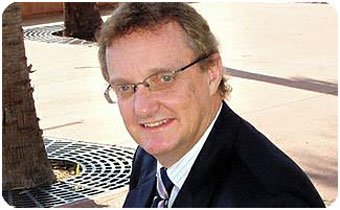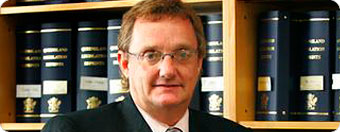The Hon Justice Peter Richard Dutney died suddenly at the age of 54, relaxing at day’s end after completing one of the final legs of a bike ride across the Simpson Desert. He was born on 22 June 1955 at Charleville in Western Queensland, the second son of Beth and Neil Dutney, a local solicitor. Gifted academically, he won a scholarship to Brisbane Boys College where, in his final year, he was Captain of Debating.
Peter displayed restless and almost inexhaustible energy. He was fond of physical pursuits, some bordering on the extreme. He had a fondness for absailing, long distance running, triathlons and long distance cycling. He ran in the Gold Coast and Berlin marathons and competed in the Noosa triathlon for ten successive years.
His interests, however, were by no means confined to the physical. Peter completed a Bachelor of Arts degree, part-time, in 1982, majoring in history and maintained an interest in history and literature throughout his life. He was a voracious reader and collector of books and enjoyed music, the theatre and the arts. His well-furnished mind and scholarly bent, coupled with his pleasing personality, made him an effective and sought after public speaker.
Peter served his articles of clerkship at Morris Fletcher and Cross (the predecessor in Brisbane of Minter Ellison) before being admitted to the Bar in 1979. His practice flourished from the outset and he was in much demand as a junior. Quite early in his career at the Bar, he developed a corporations law practice second to none which saw him in Supreme Court chambers on an almost daily basis. His practice expanded to embrace commercial work generally but was never restricted to the commercial sphere, or for that matter, entirely to civil work.
The qualities he later displayed as a judge made him a formidable barrister and advocate: soundness of judgment, quickness of mind and clarity of thought and expression, allied with knowledge of the law. His directness and ever present charm and sense of humour also did him no disservice.
Peter’s chamber colleagues, and often his juniors, had the benefit of a gregarious and irreverent companion ever ready to socialise at the end of a day with a dry martini, chilled ale or glass of respectable wine. Peter appeared to be, and most probably was, remarkably stress free. Whether in a difficult case or socialising, he never exhibited any signs of anger, stress or even mild irritation. This characteristic, coupled with his ready wit and unfailing good humour, made him the most enjoyable of companions. He was universally liked and respected.
Peter took silk in 1990 after 11 years at the Bar, continuing his busy commercial practice on a higher plane. His many fortunate juniors had the privilege of observing an advocate precisely identify the critical issues in the case and explain them lucidly and with deceptive simplicity to the Tribunal.
After Peter was appointed the Central Supreme Court Judge on 16 March 2000, he and his wife, Bronwyn, immersed themselves in the affairs of the Rockhampton community and profession. Peter became trustee of the Art Gallery, a member of the golf club and a strong supporter of the local law association. Accommodating and approachable, he ran his court efficiently. Prompt hearings were available to anyone who wanted them and were provided to some who didn’t. Yet he retained reserves of energy which were more than sufficient to severely challenge the social stamina of friends and colleagues.
 In his court, efficiency and the prompt dispatch of business did not come at the expense of patience and courtesy. His associates wondered at his ability to deal with the most difficult of litigants and the most trying of advocates without a flicker of annoyance or hint of impatience. As at the Bar, he was able to produce high quality work promptly and, in comparison with most of his peers, effortlessly. His reasons were invariably felicitously and succinctly expressed. His work was greatly valued by his colleagues and, unsurprisingly, he was held in high and affectionate regard by the Central Queensland legal fraternity.
In his court, efficiency and the prompt dispatch of business did not come at the expense of patience and courtesy. His associates wondered at his ability to deal with the most difficult of litigants and the most trying of advocates without a flicker of annoyance or hint of impatience. As at the Bar, he was able to produce high quality work promptly and, in comparison with most of his peers, effortlessly. His reasons were invariably felicitously and succinctly expressed. His work was greatly valued by his colleagues and, unsurprisingly, he was held in high and affectionate regard by the Central Queensland legal fraternity.
Through his term as the Central Supreme Court Judge, Peter participated in and invariably spoke at the Annual Central Queensland Law Association Conference. He mixed freely with members of both branches of the profession, supported and attended their functions, both in Rockhampton and Mackay, and was particularly active in encouraging young members of the profession.
Since 2003, Peter participated in a programme which provided judicial education to Bangladeshi advocates in Dhaka. Before that, he had assisted the Bar Practice Centre with advocacy training. In his earlier years at the Bar he had provided pro bono advice on a regular basis at the Caxton Street Legal Centre.
Peter returned to Brisbane at the end of 2007 and in December 2008 was appointed one of two commercial list judges. The appointment was enthusiastically welcomed by the commercial bar. He also became chairman of the Supreme Court Library Committee and was appointed to the Mental Health Court. In addition to these activities, he happily assumed the not inconsiderable burdens of membership of the Rules Committee. All of these roles were embraced with his characteristic enthusiasm. He was appointed the inaugural president of the Queensland Civil and Administrative Tribunal on 16 July 2009 and promptly assumed, in addition to his already existing workload, the burden of readying the new Tribunal for the commencement of its operation on 1 December 2009.
The Bench provided Peter an outlet for his deep-seated sense of justice, humanity and compassion, qualities which he tried, quite unsuccessfully, to mask behind a facade of irreverence. There was no prospect of his succumbing to pomposity or failing to treat lawyers, litigants and witnesses alike with patience and good humoured courtesy.
Peter is survived by his wife, Bronwyn, whom he married in February 1978, and by his sons, Paul and Sam. He leaves behind him many friends, and a legion of admirers. He will be sorely missed but never forgotten.
The Hon Justice John Muir




 In his court, efficiency and the prompt dispatch of business did not come at the expense of patience and courtesy. His associates wondered at his ability to deal with the most difficult of litigants and the most trying of advocates without a flicker of annoyance or hint of impatience. As at the Bar, he was able to produce high quality work promptly and, in comparison with most of his peers, effortlessly. His reasons were invariably felicitously and succinctly expressed. His work was greatly valued by his colleagues and, unsurprisingly, he was held in high and affectionate regard by the Central Queensland legal fraternity.
In his court, efficiency and the prompt dispatch of business did not come at the expense of patience and courtesy. His associates wondered at his ability to deal with the most difficult of litigants and the most trying of advocates without a flicker of annoyance or hint of impatience. As at the Bar, he was able to produce high quality work promptly and, in comparison with most of his peers, effortlessly. His reasons were invariably felicitously and succinctly expressed. His work was greatly valued by his colleagues and, unsurprisingly, he was held in high and affectionate regard by the Central Queensland legal fraternity.